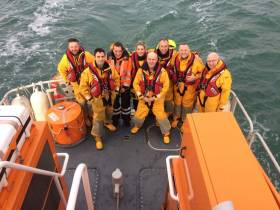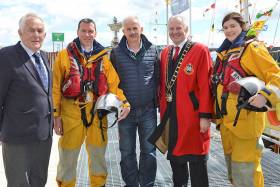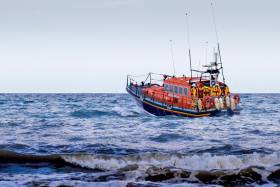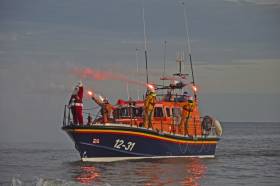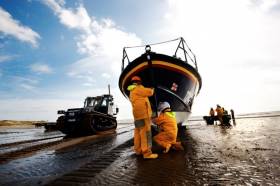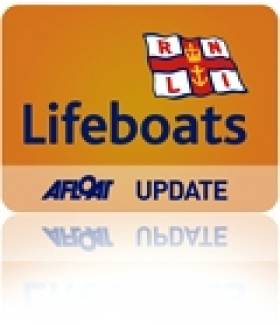Displaying items by tag: Clogherhead
PJ Gallagher & Friends To Hold Dun Laoghaire Comedy Night In Aid Of RNLI
#RNLI - Comedian, radio host and TV personality PJ Gallagher is to hold a night of fun and laughter with some of Ireland’s top comedians to raise funds for the RNLI.
The one-off event is being staged at Dun Laoghaire’s Pavilion Theatre on Sunday 4 March, where PJ will be joined by friends Deirdre O’Kane, Eric Lalor, Joanne McNally and more.
Funds raised on the night will go to help the charity with their work in saving lives at sea and prevention.
PJ became aware of the work of the RNLI in Dun Laoghaire when he was passing the station and lifeboat mechanic Kieran ‘Colley’ O’Connell invited him in to look around.
The pair struck up a friendship, and PJ has been a regular visitor at the station since then. When he heard about he work of the RNLI he made up his mind to do an event to raise funds.
Speaking about his decision to hold the comedy night and to ask some of his famous friends to support it, PJ said: “I live near the lifeboat station and was aware of the work of the RNLI but it was only when I met Colley that I really learned what it was all about. These men and women are volunteers and they leave their jobs and lives to come and help those in trouble at sea.
“We have a big beautiful lifeboat on view in Dun Laoghaire Harbour but when it’s gone, sometimes in the middle of the night, that’s when they are doing their amazing work. I asked some friends if they’d help with a fundraiser and they jumped at the chance. In fairness, you never know when this lot might need rescuing.”
Kieran added: “We are really thrilled that PJ and his friends are holding this night for us. We get a lot of visitors into the station and they are always delighted to hear about the work we do and you hope it stays with them but PJ has stayed in contact and become a firm friend of the station.
“I just hope he knows what he is letting himself in for as most of the crew will be attending and if their pagers go off there could be a lot of people running for the doors suddenly. I hope they won’t take it personally.”
The gig is selling fast, with only a small number of tickets remaining. Tickets are priced at €24 and are available from the box office directly at www.paviliontheatre.ie or 01 231 2929.
Night at the Oskars
Elsewhere, members of Clogherhead RNLI have been overwhelmed with the local support for ‘The Night at the Oskars’, a special night being staged to raise funds for the station’s new Shannon class lifeboat due in 2019.
Taking place on Saturday 3 March at the TLT in Drogheda, the evening will see local people star in seven short films recreating some of the most well-known and successful blockbusters over the last few years.
The red-carpet event is formal or black-tie dress and tickets are priced at €30.
Last June Clogherhead RNLI launched a €150,000 fundraising appeal at the Drogheada Maritime Festival towards the cost of the new Shannon Lifeboat, which is expected to total some €2.5 million.
The majority of the funding will be provided through an Irish legacy, and Clogherhead RNLI and affiliated branches in Meath and Monahan are making a commitment to raise €150,000 towards the cost of the project through a community appeal.
Tickets can be obtained at the Clogherhead Lifeboat Station each Saturday and Sunday from 10am to 2pm until 3 March or through phoning Tomas on 086 809 4690.
#RNLI - Clogherhead and Skerries RNLI rescued a man whose fishing boat got into difficulty north of Dublin Bay yesterday afternoon (Thursday 1 February).
The volunteer crews were requested to launch the all-weather lifeboat from Clogherhead and the inshore lifeboat from Skerries at around 1pm after a request from the Irish Coast Guard to assist the skipper of a 10m fishing vessel, which had got into difficulty four-and-a-half miles northeast of Skerries.
The vessel had lost engine power while on passage from Kilmore Quay to the Shetland Islands.
Skerries RNLI was first on the scene, and after assessing that no one was in immediate danger, they worked with the skipper to take the fishing boat under tow.
With winds from the northwest gusting up to 30 knots at the time and seas up to three metres high, a decision was made due to the weather conditions to transfer the tow line to the Clogherhead all-weather lifeboat.
The fishing vessel was then successfully towed into Skerries Harbour and tied up at 2pm.
Speaking following the callout, Clogherhead RNLI volunteer lifeboat press officer Gerry Kelly said it was “a fine example of RNLI volunteers from neighbouring stations working well together to help bring someone to safety.
“We would remind anyone going to sea, regardless of their activity, to always respect the water. Always wear a lifejacket and always carry a means of calling for help and keep it within reach.”
Carrybridge Lifeboat Rescues Cruiser From Rocks
#RNLI - Carrybridge RNLI’s lifeboat and rescue water craft were requested on Wednesday afternoon (23 August) to launch to a 30ft cruiser which had encountered fuel issues and drifted onto rocks on Upper Lough Erne.
The casualty vessel, with two persons on board, was located around a mile north of the Crom Estate in Co Fermanagh. The RNLI crew assisted in refloating the vessel and towed it back to Geaglum Jetty.
Elsewhere, Clogherhead RNLI in Co Louth launched on the same afternoon in response to a report that a razor clam fishing boat was sinking off Drogheda Bar.
While the lifeboat was en route to the scene, the two fishing crew were rescued by the Drogheda Pilot Boat, taken upriver and transferred to an ambulance.
The lifeboat travelled at full speed to the scene and on arrival found the casualty vessel almost totally submerged. The RNLI crew managed to locate the boat's EPRIB among the debris.
Clogherhead RNLI Launches €150K Lifeboat Appeal
#RNLI - Clogherhead RNLI in Co Louth officially launched the station’s €150,000 Shannon lifeboat appeal on the final day of the Drogheda maritime festival yesterday (Sunday 11 June).
The total cost of Clogherhead’s new Shannon class all-weather lifeboat will be in the region of €2.5 million, the majority of which will be provided through an Irish legacy.
However, the lifeboat station must raise €150,000 towards the cost of the project through a community appeal before the lifeboat is due to go on service in 2019.
The current Clogherhead lifeboat, Doris Bleasdale, is a Mersey class that can reach a top speed of 15 knots.
In the last five years, the lifeboat crew in Clogherhead have launched their lifeboat 58 times and brought 60 people to safety.
With a Shannon class lifeboat, designed by Derry man Peter Eyre, those launches will be even faster with its top speed of 25 knots, and improved range and manoeuvrability thanks to its waterjet propulsion, which also allows the vessel to operate in shallow waters and be intentionally beached.
The official launch took place in the presence of the Mayor of Drogheda Oliver Tully and the Drogheda Harbour Master Captain Martin Donnelly on the new pier for visiting yachts at Drogheda Port, which was itself launched at the weekend during the Irish Maritime Festival.
Speaking at the launch, Drogheda Mayor Oliver Tully paid tribute to the Clogherhead lifeboat crew.
“When we hear of the RNLI going to sea we think of Clogherhead and we think of the all the lives you have saved and your predecessors before you. I would like to thank you for the tremendous work that you do. It is the Clogherhead lifeboat but is supported by everyone in the surrounding area.”
The Mayor also hailed lifeboat mechanic Padraig Rath for keeping the current lifeboat in pristine condition for 24 years.
Coxswain Tomas Whelehan added: “We are delighted that this day is finally here and we can announce the news of a Shannon class lifeboat for the east coast. We have been overwhelmed with the goodwill of people and offers of support. This new lifeboat will represent everyone in our communities as well as those who visit our shores for work or pleasure.
“Our lifeboat crew launch in all conditions at any time of night or day to bring loved ones home. The least we can do is give them the very best in lifeboat technology. Not all callouts are rescues and sometimes there is tragedy but whatever the call, our crews are always ready to answer it and our lifeboat always ready to be launched.”
For further details of how to get involved with the Clogherhead RNLI Shannon project, contact the station at 041 982 2600 and follow the Facebook page for updates.
Busy Easter Monday For Clogherhead Lifeboat
#RNLI - It was a busy Easter Monday (17 April) with two consecutive callouts for Clogherhead RNLI in Co Louth.
At 6pm, the all-weather lifeboat was launched to assist a razor boat in difficulty off Mosney in Co Meath. The casualty boat was taken in tow and safely tied up at Skerries.
On returning north to Clogherhead, the volunteer crew were requested at 9.15pm to assists the rescue of three people whose boat upturned on the River Boyne, as previously reported on Afloat.ie.
#RNLI - Clogherhead RNLI has looked back on 2016 and paid tribute to all those who made it such a memorable year for the lifeboat station and its volunteers.
Throughout the year the station worked with other community groups and organisations to promote their work and the Co Louth coastal village, resulting in a busy calendar of events and successful partnerships.
But it was also an eventful year on the water, with lives saved — and sadly lost, too.
Back in March the lifeboat was launched to reports of a distress signal from a fishing vessel located 25 miles east of Clogherhead, recovering its liferaft and beacon after the coastguard winched its three fishing crew to safety.
Later that month, RNLI volunteer lifeboat crew from across Ireland took part in the Easter 1916 centenary commemoration which saw over 700 members of the Irish emergency services taking part in the biggest parade in the history of the state.
Fifty RNLI volunteers came from 29 lifeboat stations around the country to parade through Dublin city centre to mark the centenary. The RNLI formed part of the emergency services section of the parade which recognised the ‘blue light’ agencies serving the Irish State since its foundation.
Representing Clogherhead RNLI was volunteer shore crew member Carolyn Stanley — granddaughter of Joe Stanley, Pádraig Pearse’s press agent and printer.
During the Easter Rising, Pearse relied on Stanley to convert his handwritten communiques into printed documents for onward circulation throughout the city. It was Stanley who published the first documents of the newly proclaimed republic.
In June, four Louth volunteers were honoured at the annual RNLI Awards, held in the Guinness Storehouse, for their contribution to the charity.
Brendan Hoey received a Bar to Gold Badge for his 30 years of volunteering, while Anne Levins, Terry Rath and Deirdre Delaney received Gold Badges for their outstanding contribution to volunteering.
Between them, these volunteers have given thousands of hours to the RNLI, working hard to raise awareness and funds for the work of the charity in Clogherhead.
In July, Clogherhead RNLI threw open its doors to welcome the community in for their annual open day, which enjoyed a record-breaking attendance.
Another highlight of the year was Clogherhead RNLI’s involvement in the Pride of Place competition along with many other community groups and speakers.
The ‘Community Oscars’ saw Clogherhead top the prestigious Island and Coastal Community category. The station was proud to be part of the submission and spoke about their work and involvement in the community highlighting their history and life-saving work.
The summer also saw the Drogheda Maritime Festival take place, and the Clogherhead volunteers brought their all-weather lifeboat down to the quayside.
They also welcomed some VIPs from Belarus, regular visitors to Ireland with the Chernobyl Children’s Charity, to their stand and onboard the lifeboat for a personal tour.
Each year Clogherheard RNLI station mechanic Padraig Rath helps the charity organise the St Stephen’s Day Swim on Clogherhead beach, which last year raised €6,000 for a building project to rehouse children living in institutions.
Sadly the year was not without tragedy, when local man and diver Craig Byrne lost his life in September. The whole village was in mourning, and Craig is remembered with great affection. The thoughts and sympathies of everyone with Clogherhead RNLI are with his family and loved ones.
As the year draws to a close and a new one beckons, Clogherhead RNLI found themselves rescuing Santa Claus and landed him on the beach to be met by local school children.
This followed the popular ‘Polar Plunge’ which was held for Special Olympics on Clogherhead beach and where the lifeboat station was operations hub on the day.
The team will once again round out the year supporting the Chernobyl Swim on St Stephen’s Day. This will be the 16th annual swim and funds raised will assist with the treatment of Chernobyl heart syndrome — a life-threatening condition affecting 6,000 children each year.
Diver Dies After Rescue Off Clogherhead
#Diving - TheJournal.ie reports on the death of a diver who got into difficulty off Clogherhead in Co Louth on Monday (29 August).
Clogherhead RNLI and the local Irish Coast Guard unit were called to the scene around 5.30pm on Monday afternoon, with the Dublin-based Rescue 116 winching the casualty from the water.
He was subsequently airlifted from Port Oriel to Our Lady Of Lourdes Hospital in Drogheda, where he was pronounced dead yesterday morning (Tuesday 30 August).
The Irish Mirror has more on the story HERE.
#RNLI - Clogherhead RNLI's volunteer lifeboat crew launched their all-weather lifeboat at 11:50am yesterday (Sunday 20 March) in response to a distress EPIRB signal received from a fishing vessel located 25 miles east of Clogherhead.
While en route to the location of the signal, the Clogherhead crew was informed that the Irish Coast Guard helicopter Rescue 116 had winched the three people from a liferaft and were proceeding to hospital.
The lifeboat continued on to the signal's location in good weather and calm seas, arriving at the scene at 1:38pm. The liferaft was located and recovered and the EPIRB was found nearby a short time later.
No Time To Lose As Clogherhead Trawler Sunk Without Trace
#RNLI - RNLI Magazine revisits the fateful day last summer off Co Louth when a fishing trawler went under in a matter of minutes.
Despite the clear day and calm seas, as previously reported on Afloat.ie, the razor clam boat with two fishermen on board sank without warning off Port Oriel on Clogherhead after 5pm on 23 August last.
But in a fortunate turn of events, the sinking vessel was seen from a nearby fishing boat skippered by Sean Flanagan – who also happens to be one of the local RNLI's highly trained volunteer crew.
Flanagan got on the phone to deputy coxswain Tomas Whelahan to spark the lifeboat launch before calling in a Mayday and going to the aid of the sinking boat along with his son Donal.
From the deck of their Naomh Óisín, they could spot smoke rising from the engine of the stricken vessel, and getting closer they could see it was listing badly.
So there was no time to lose: once Sean had radioed details to the Dublin Coast Guard, he and Donal hauled their gear and made haste to the sinking boat and its two-man crew now vulnerable in the water.
RNLI Magazine has much more on the story HERE.
Clogherhead Lifeboat Crewman Rescues Two After Fishing Boat Sinks
#RNLI - A lifeboat crewmember from Clogherhead RNLI has been praised for his swift actions in rescuing two men from a fishing vessel that sank at the weekend.
Sean Flanagan and his son were fishing approximately two miles away from Port Oriel in Co Louth on Saturday 23 August when they noticed a Razor fishing boat sink a mile in the distance shortly before 5.30pm.
Flanagan, a highly trained volunteer crewmember, raised the alarm and made a Mayday call. He quickly hauled his gear and made best speed to the scene where he found two men in the water alongside their sunken boat.
Together with his son, Flanagan successfully pulled the men out of the water and into the safety of his vessel.
Meanwhile, Clogherhead RNLI’s all-weather lifeboat under coxswain Tomas Whelan and with four crewmembers on board had launched and made its way to the scene. The Dublin-based Irish Coast Guard helicopter Rescue 116 was also tasked.
Weather conditions at the time were described as good with clear visibility and a calm sea state.
The casualties were transferred to the lifeboat on arrival where they were medically assessed by lifeboat crew. They were then airlifted by helicopter to Our Lady of Lourdes Hospital in Drogheda.
Speaking following the callout, Whelan said: "We have to commend the swift actions of our lifeboat crew member Sean Flanagan who not only made the Mayday call for the emergency services but then rapidly went to the scene and rescued the two men from the sea."


























